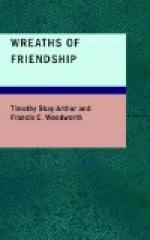“He’s their uncle, may be.”
“Or their grandfather.”
“Or somebody else that is kind to children.”
No doubt of it in the world. He is some one who likes children, you may be sure. And I suppose he’s got a pocket full of sugar-plums or nuts for his favorites. The little girl who has seized his cane, I rather think, will get the largest share; but I don’t suppose her young companions will be at all displeased at this, for no doubt she is a very good girl, and beloved by all. Indeed, if we may judge by the faces of the children, not one of them will look at what the other receives, to see if he has not obtained the largest share.
This is not always so, however. I know some little boys and girls, who, when their parents, relatives, or friends give them cakes, candies, or playthings, immediately look from what they have themselves to what the others have received, and, if one thinks his share smaller or inferior, becomes dissatisfied, and, from a jealous and envious spirit, sacrifices his own pleasure and that of all the rest. Because there is a square inch more of cake in his brother’s piece, that which he has doesn’t taste good. If he have one sugar-plum less than the others, they become tasteless, and he throws them all, perhaps, upon the floor.
How bad all this looks, and how very bad it really is! The friends of such children are never encouraged to make them presents. They rather avoid doing so; for they know that their greedy, envious, covetous spirit, will turn the good things they would offer them into causes of strife and unhappiness.
THE BOY AND THE ROBIN.
I.
So now, pretty robin, you’ve come to my door;
I wonder you never have ventured before:
’Tis likely you thought I would do you some harm;
But pray, sir, what cause have you seen for alarm?
II.
You seem to be timid—I’d
like to know why—
Did I ever hurt you? What makes you
so shy?
You shrewd little rogue, I’ve a
mind, ere you go,
To tell you a thing it concerns you to
know.
III
You think I have never discovered your
nest;
’Tis hid pretty snugly, it must
be confessed.
Ha! ha! how the boughs are entwined all
around!
No wonder you thought it would never be
found.
IV.
You’re as cunning a robin as ever I knew; And yet, ha! ha! ha! I’m as cunning as you! I know all about your nice home on the tree—’Twas nonsense to try to conceal it from me.
V.
I know—for but yesterday I
was your guest—
How many young robins there are in your
nest;
And pardon me, sir, if I venture to say,
They’ve had not a morsel of dinner
to-day.




